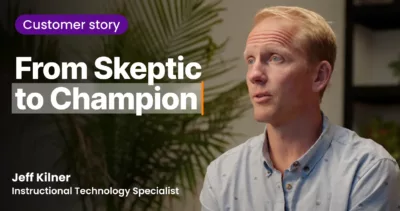Social and Emotional Learning | Why it matters for your students

What is social-emotional learning?
Social and emotional learning (SEL) is all about equipping learners with emotional competencies and behaviors to best cope with potential life challenges. SEL ensures that learners become empowered, resilient, and kind citizens once they leave the comfort of your classroom.
A great way to visualize SEL is using the Collaborative for Academic, Social, and Emotional Learning (CASEL) framework, which includes the following SEL skills:
- Social awareness
- Self-awareness and self-management (including emotional skills, mindfulness, and mental health well-being)
- Relationship skills
- Responsible decision making
Let’s break them down…
Social Awareness
Social awareness is a really important part of learners’ emotional development. It’s all about empathy for those within and beyond the elementary school, middle school, or high school gates. It’s about listening to and respecting the ideas and opinions of people from all different backgrounds and understanding the importance of their voices. Being socially aware directly combats societal inequity and increases inclusivity both inside and outside your classroom.
So how can you bring this into your learning curriculum? Easy! Here’s some inspo for you:
Next time you ask students a question, get them to consider what young people, other than themselves, might answer – how does it differ from their own view? Why?
When delivering content, consider reflecting on how the information could be more or less relevant to learners from different socio-economic backgrounds. Is it more relevant to the school district that you teach in?
Social awareness and increased empathy skills are proven to assist conflict resolution between students – so students‘ lives and the school day are that little bit smoother for everyone. If you’re an elementary school teacher, check out our blog about the importance of emotional check-ins for elementary students.
Self-Awareness and Self-Management
Self-awareness and self-management are two core competencies centered on learners’ ability to identify their feelings and emotions, and to respond in a way that shows their amazing manners! SEL lessons teach learners to use social-emotional skills when responding to challenges – maintaining core values of honesty, integrity, and wellness.
Stuck for ideas? Consider the contexts in which self-awareness has been vital. For example, the pandemic has been a challenging time for you teaching heroes and learners alike. Get your students to reflect on how lockdown made them feel and how they coped:
What were some of the most difficult challenges?
How did they remain resilient?
Could their strategies help others?
Self-aware learners create a positive school climate; a positive school climate reduces the need for interventions and improves academic performance and academic achievement – happy days! For more information about how to help your students be aware of their emotions, check out our blog about emotional check-in techniques.
Relationship skills
Building positive relationships is all about clear and constructive communication. During their time at school, learners will be exposed to several learning environments where they‘ll need to work collaboratively. They‘ll need to communicate effectively, develop positive partnerships, and seek and offer help to people they‘re working with.
How can you use SEL programs to improve learners‘ relationship skills? Next time you do group work with your students, get them to:
Assign each group member a specific, measurable, and achievable role.
Discuss their expectations for each team member before beginning the task.
Reflect on how they worked as a group once the task is complete.
Engage in positive, but honest, conversation!
Responsible Decision Making
Making responsible decisions is the last of the SEL competencies. It‘s all about demonstrating curiosity and open-mindedness. Learners should be encouraged to:
Make reasoned judgments after closely considering all the information, data, and facts available to them.
Anticipate and consider the consequences of the decisions they make on themselves and others.
Every decision has consequences and learners should be equipped to make choices that result in the best outcome for all. Jump in and try SEL in your classrooms!
Blogs you may also like

Virtual Campus School: Turning Learning Barriers into Breakthroughs with Kami

How Jeff Kilner and His District Transformed Teaching with Kami


